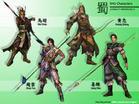Word-by-word appreciation of the best sentences in "Romance of the Three Kingdoms"
Governor Han Fu said: "I have a great general Pan Feng, who can behead Hua Xiong."
The use of the word "太" (tai) is excellent! Tai means extremely large. In ancient times, it was written as "大" (da) and also as "泰" (tai). Whenever something is described as large but seems insufficiently descriptive, the character tai is used. Here, the character tai fully demonstrates Han Fu's talent, thereby indirectly highlighting Pan Feng's martial prowess. A strong commander has no weak soldiers!
The use of the word "守" (shou) is excellent! Shou refers to the governor of a commandery, indicating Han Fu's position, which indirectly highlights Pan Feng. It actually implies that Pan Feng is the foremost warrior of Ji Province.
The use of the word "韩" (Han) is excellent! The Han surname has always been colorful and highly prestigious. The founder of the Legalist school, Han Fei, is an outstanding representative of the Han family. His work, *Han Feizi*, with over fifty chapters, remains a must-study classic for those interested in legalism. The use of the character Han here reflects Han Fu's great talent and vision.
The use of the word "馥" (fu) is excellent! The character fu describes fragrance and is obviously more elegant than the simpler "香" (xiang). Han Fu’s name is extraordinary and refined. Imagine if it were replaced with something like "Governor Han Jianguo," the poetic quality would be greatly diminished.
The use of the word "曰" (yue) is excellent! A single yue conveys neither humility nor arrogance, showing that Han Fu holds a significant position among the feudal lords without being overbearing.
The use of the word "吾" (wu) is excellent! Instead of saying "在下" (zai xia) or "小可" (xiao ke), the single wu fully embodies Han Fu's confidence.
The use of the word "有" (you) is excellent! The single you creates anticipation for what follows, setting the stage for the entrance of the great general.
The use of the word "上" (shang) is excellent! The original meaning of shang refers to high rank and superior quality. Here, it forms part of Pan Feng's title, fully demonstrating his exceptional strength.
The use of the word "将" (jiang) is excellent! Jiang means commander (《Shuowen》). This single character radiates boundless valor, further enhancing the atmosphere for Pan Feng's entrance.
The use of the word "潘" (Pan) is excellent! Pan, with water, rice, and fields, is an exceptionally vivid surname, subtly hinting at the thunderous power of the great general. Imagine if it were not Pan Feng but Wang Feng—it would evoke the image of a laid-off female worker, wouldn’t it?
The use of the word "凤" (Feng) is excellent! Feng means divine bird, and in ancient times, it symbolized a person of saintly virtue. Here, it implies that General Pan possesses not only unmatched bravery but also remarkable talent, serving as a moral example to other generals.
The use of the word "可" (ke) is excellent! A single ke shows Han Fu's full confidence in Pan Feng's victory. The absence of any uncertain modifiers before ke makes one even more anticipatory.
The use of the word "斩" (zhan) is excellent! First, it shows Han Fu's complete trust in Pan Feng's martial prowess; second, it further enhances the atmosphere; third, it indicates Han Fu's hatred for Dong Zhuo's forces. Han Fu detests evil and deeply hates Dong Zhuo for his numerous crimes. If this were changed to "can fight Hua Xiong," the momentum would be greatly reduced.
The use of the word "华" (Hua) is excellent! In ancient texts, Hua implicitly carries the meaning of "showy but insubstantial." For instance, phrases like "华辞" (flowery rhetoric), "华誉" (unsubstantiated reputation), and "华风" (superficial writing style). Here, the use of Hua contrasts with Pan, making the strength disparity immediately apparent.
The use of the word "雄" (Xiong) is excellent! On the surface, it seems to indicate Hua Xiong's strength, but quite the opposite is true—"Xiong" sounds the same as "熊" (bear), often used to describe incompetent people, such as "Nobi Nobita," a cowardly character. Contrasted with "Feng," it highlights Hua Xiong's rashness and further underscores Pan Feng's abilities.
Reprinted from: http://tinyurl.com/3hmhm8
For the challenge competition, please see here: http://tinyurl.com/3zpvk4




